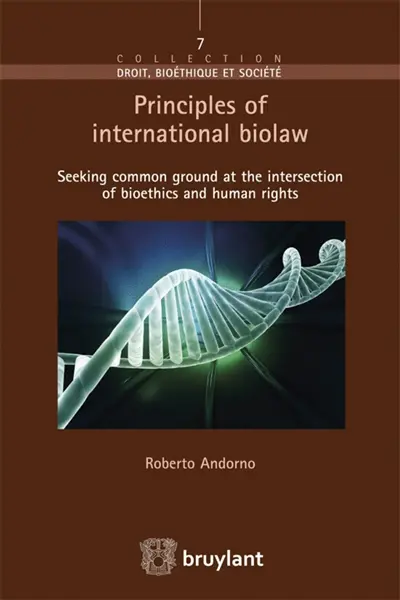en savoir plus

Permet à tous ses détenteurs d'obtenir 5% de réduction sur tous les livres lors du retrait en magasin (réduction non cumulable avec les réductions de type étudiant).
Offre également un certain nombre d'avantages auprès de nos partenaires.
Avec les favoris, retrouvez dans un espace les sélections effectuées au fur et à mesure de vos navigations dans le site.
Constituez pour votre usage personnel vos listes de livres en prévisions d'achats futurs et votre sélection d'articles, dossiers, événements, vidéos ou podcasts préférés ou à découvrir plus tard...
Il suffit simplement de cliquer sur "Ajout Favori" sur chaque page qui vous intéresse pour les retrouver ensuite dans votre espace personnel.
Requiert un compte Mollat
Requiert un compte Mollat
Principles of international biolaw : seeking common ground at the intersection of bioethics and human rights
Auteur : Roberto Andorno
en savoir plus
Résumé
Cette étude présente les principes directeurs du droit international biomédical, commente les principaux instruments internationaux de régulation de la bioéthique et offre une analyse des questions nouvelles dans ce domaine. ©Electre 2026
Quatrième de couverture
Rapid advances in genetics and medicine present both opportunities and threats to the advancement of human rights and public health in this era of globalization. While such advances contribute significantly to progress against disease, they may also pose profound global public policy concerns in that the ethical and policy considerations that follow from scientific advances lag far behind. In this context, the aim of this book is to present the current global efforts to develop common principles relating to biomedicine. Section I sets forth the pivotal role that the principle of human dignity plays in this domain, and identifies a number of other principles that can be drawn from the recent international policy documents on bioethics. Section II provides detailed commentaries on recent international instruments relating to biomedicine adopted by UNESCO and the Council of Europe. Section III elaborates upon specific biomedical human rights issues that are the subject of contemporary international standard-setting efforts, including biomedical research, population biobanks, genetic testing, and advance directives. Essays in each of these sections examine the extent to which promoting and protecting human rights has created a common framework for contemporary international lawmaking in the field of biomedicine and the strengths and limitations of international law as a tool for advancing biomedical human rights.
Fiche Technique
Paru le : 19/09/2013
Thématique : Droit de la santé - Hospitalisation
Auteur(s) : Auteur : Roberto Andorno
Éditeur(s) :
Bruylant
Collection(s) : Droit, bioéthique et société
Série(s) : Non précisé.
ISBN : 978-2-8027-4201-2
EAN13 : 9782802742012
Reliure : Broché
Pages : 219
Hauteur: 24.0 cm / Largeur 16.0 cm
Épaisseur: 1.5 cm
Poids: 350 g

